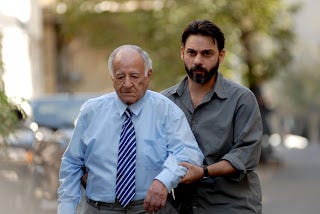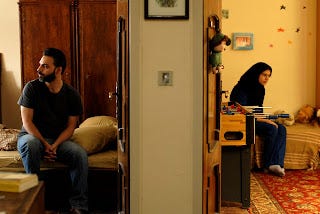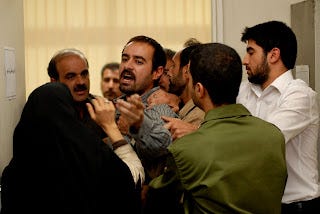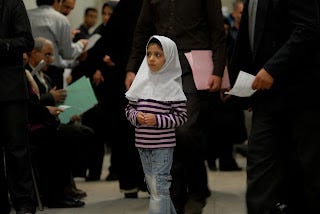Review: "A Separation" is a timeless masterpiece about the emotions that guide us and tear us apart

Film Rating: A+
The opening scene of Asghar Farhadi’s “A Separation” is one long, still take, framed from the eyes of a judge as he listens to a divorcing couple, Simin and Nader. Simin wishes to take her family and leave Iran, so that she may craft a better life for her daughter, Termeh, but Nader wants to stay so he can look after his ailing father, and is unwilling to give up custody of Termeh. Simin has therefore filed for divorce, and in this one extended take, we watch as their eloquent arguments dissolve into a bitter, passionate, and above all, desperate verbal quarrel. The camera is placed at the judge’s eye-line to put us in his mindset: we see two people, both correct in some ways, ignorant in others, but bursting with entirely valid emotions, and we are asked to come to a simple and fair conclusion. Such an outcome is impossible, yet we are tasked with providing a solution.
It is a hopeless, painful, and blindingly poignant introduction. By framing the shot the way he does, Farhadi is, in essence, teaching us how to watch his movie. For the rest of the film, we shall continue to observe good people struggling under morally and emotionally complex situations, situations where a million questions are asked and no answers can possibly be given. Farhadi inhabits his film with wonderful characters, all of them as layered and nuanced as any human being alive today, yet from this first scene, I found myself sympathizing most strongly with the faceless judge and his colleagues, those troubled people tasked with boiling down the infinite complexities of the human condition into a simple binary resolution. The viewer, at least, can walk away with ambiguity, debating and pondering the proceedings without having to make any decisions, but the judge gets no such solace.
The world of cinema, meanwhile, gets a new masterpiece. “A Separation” will, I believe, be cherished, discussed, and debated for as long as this art form remains relevant. Continue reading after the jump...

In that first scene, Simin is denied her divorce, so she moves out of her home. Nader is forced to find someone else to take care of his father while he is away at work, so he hires Razieh, a poor, deeply religious woman who is four months pregnant. Razieh – who must also take care of her young daughter while she works – is soon overwhelmed as the father’s condition worsens. One day, Nader returns home early to find his father unconscious on the floor and Razieh nowhere to be found. When she returns, he is furious and she is defensive. Neither have all the facts, but the viewer has most of them, and in the altercation that follows, we cannot put any significant blame on either party. Razieh suffers a miscarriage falling down the stairs as Nader makes her leave the apartment; Razieh and her husband charge Nader with murder, and as the case unfolds, each character finds their lives and consciences spinning out of control.

This is only a simple synopsis, for what Farhadi accomplishes here cannot easily be described. “A Separation” is a film about human emotions, and those cannot be clearly expressed through words. Nor can they be effectively bound by the confines of law, nor will they ever cease being a barrier from reason. All of the film’s characters are partially responsible for the legal and moral mess they find themselves in, but their feelings prevent them from being able to take a step back and look at the bigger picture. Only the viewer is allowed to see all sides of the argument – and all ensuing emotions – at once, and the film is therefore a revelatory and overwhelming experience. We each go about our daily lives wrapped up in our own experiences, and these characters are no different; “A Separation” is powerful because it gives us the chance to fathom the communal feelings and standpoints of one complex, relatable group of people all at the same time, rendered with piercingly authentic realism.

Farhadi’s script is practically Shakespearean in the way it meditates on so many interwoven themes primarily through language, and the film absolutely deserves the Original Screenplay Oscar it has been nominated for. But make no mistake – “A Separation” is a uniquely cinematic experience. I have already described one creative and telling use of cinematography Farhadi employs, but there are many more; I doubt there is a single shot in the entire film not framed to produce meaning in tandem with the script. The editing is effortlessly transparent, especially impressive in a dialogue-driven drama where creating coherent space is paramount to the story’s success. But “A Separation” earns its greatest cinematic bonafides from its cast. Each actor turns in an absolutely beautiful, gripping performance, and singling out one or two for praise would be irresponsible. Each performance is equally realistic, moving, passionate, and intimate to a degree only screen acting allows, and it’s these qualities that allow Farhadi’s script to be realized so successfully.

There is little more to say about “A Separation” without diving into a full scene-by-scene analysis, a task that will surely be undertaken by writers more talented than I in the months or years to come. For me, the film’s final scene says it all. In it, Farhadi boils down the entire story to one question, a question we cannot answer. The entire affair is too painful for such wretched simplicity. As we ponder it, the camera rests on Simin and Nader sitting in the court’s hallway, dozens of similarly distressed people stretched out behind them in a demonstration of how universal this story truly is. Farhadi could tell another equally piercing tale about any person who has wound up in that hallway or, indeed, any member of the audience, for this is a story we’ve all taken part in at one point or another. As humans, we are inseparably bound and irreversibly separated by our emotions, a painful paradox that few, if any filmmakers have ever captured with such incredible grace.
"A Separation" is currently playing at the Landmark Mayan in Denver, and select other theatres nationwide; it will expand to other cities next week. It nominated for Best Original Screenplay and Best Foreign Language Film at the Academy Awards.

